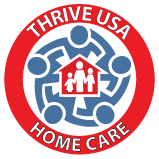3 Things to Consider before Becoming your Parents Caregiver
Each year, more than 43 million men and women take on the role of caregiver for their parents, senior family members, or close friends. The National Alliance for Caregiving reported that 36percent of the 65 million unpaid caregivers in the U.S. are caring for an aging parent.
Caregiving can be very rewarding, however, it can also be very demanding. Caregiving allows you to spend time with your loved one, and it provides you with the opportunity to make sure they are receiving the best care possible. Every day, adult children are considering taking on the primary role of their parent’s caregiver, advocate, provider, coordinator, and manager of all home care tasks. You will need to learn how these added responsibilities can impact your life. Here are some factors to consider before you step into the role of the family caregiver.
Knowing Your Capabilities
Are you capable of taking care of your aging loved one all by yourself? If you can, that is awesome. However, if you are juggling their care in addition to a full-time job and your own family responsibilities, hiring outside help like ThriveUSA to manage day-to-day activities and requirements, may be necessary.
Understanding Your Parents Medical Needs
Are you willing to take care of the medical conditions of your parent as they progress with age?
Becoming your parent’s primary caregiver means you become their biggest advocate.
Understanding their current conditions and possible progressions is critical. Knowing what to expect can help you make better decisions about the care of your parent, how involved you are, and when you need to seek professional support. For example, caring for someone with dementia or Alzheimer’s can be difficult to do alone.
Personal Support System
Do you nearby family members to help you? As a caregiver, ignoring your own needs is very common as the care of your parent increases, and this can lead to burnout. It’s important for a caregiver to have time to “recharge their batteries”. Failure to pay attention to your personal happiness and fulfillment can create resentment over time as you continue to prioritize others before yourself. If family members cannot step up to give respite care to you, getting outside support needs to be considered.
Families who find it difficult to care for their aging loved ones without assistance can benefit greatly from professional respite care. Northern Maryland family caregivers who need a break from their Caregiving duties can turn to ThriveUSA. Our respite caregivers can encourage your loved one to eat well, exercise regularly, get plenty of mental and social stimulation, and focus on other lifestyle factors that promote longevity. Call one of our Personal Care Coaches at (301)
882-4717 to design a care plan for your senior loved one.


